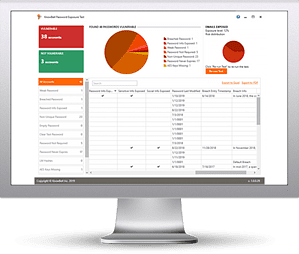As the cyber threat landscape continues to evolve, passwords and anti-virus software simply aren’t enough anymore. And while there’s no silver bullet that totally eliminates all attacks, employing a Multi Layered Defence will definitely help.

The Fourth Industrial Revolution, also known as 4IR and Industry 4.0, is a term used to describe a new amalgamation of the physical, biological and digital worlds. It combines engineering with science, Artificial Intelligence (AI), robotics, quantum computing, the Internet of Things (IoT) and other emerging technologies. Together, these new systems, processes and tools are completely changing the world around us – and the way we live in it.
It may sound like the stuff of sci-fi movies, but most of us have been using at least some of these services for a while. Sat Navs, mobile banking apps, iPhone face scans and tools like Alexa are a common part of daily life. But it’s perhaps in the workplace that the 4IR is having the biggest impact; disrupting every business sector at an unprecedented pace.

A Brief History of Industrial Revolutions
Most people are aware of the first Industrial Revolution, which took place in the 18th Century. It was prompted by the invention of the steam engine, and with these new machines came new opportunities and huge social, cultural and economic changes. The second revolution saw the invention of electricity, mass production and other big scientific improvements, and the third saw the birth of computers and digital devices such as clocks.
In 2016, the founder of the World Economic Forum Klaus Schwab wrote a book entitled The Fourth Industrial Revolution, which outlined the effects - good and bad - that technological innovation is having on the world.
These technologies include:
Blockchain: Often confused with cryptocurrency, blockchain is actually a type of storage facility that enables cryptocurrency such as Bitcoin to be created and exchanged in monetary terms.
Biotechnology: This kind of technology merges tech with biology. It’s particularly prevalent in the pharmaceuticals industry, because it allows scientists to develop cellular and biomolecular processes for the production of new drugs, among other things. It’s also used in manufacturing and is making great strides in the production of greener, more efficient energy.
Virtual Reality (VR) and Augmented Reality (AR): VR is all about immersive digital experiences that simulate the world around us (currently via a headset) whereas AR is a combination of the physical and digital worlds, such as mobile apps that allow us to add filters and change the appearance of selfies.
3D Printing: Printers have come a long way in the past few years, and today’s 3D versions enable users to create actual objects based on an image. Manufacturers can now print their own parts, while in the medicine world prosthetic limbs, tissues and even organs are now being produced.
Robotics: The sci-fi books of the 1960s often spoke about the possibility of robots taking over the world, and with the latest developments it doesn’t seem like such a far-fetched notion! While we’re a long way from having walking, talking and free-thinking robots in every home, they’re becoming increasingly advanced and playing an important role in everything from manufacturing to health and safety.
The Internet of Things/IoT: This is a term that covers a huge range of devices, from smart mobile phones and security cameras to wearable health and fitness devices, smart phones, smart fridges, thermostats and mobile devices.
Other technologies included in the Fourth Industrial Revolution include data storage, Cloud computing, cyber security technology, renewable energy…and much more.
The Impact on Businesses
There’s no doubt that the Fourth Industrial Revolution is having a huge effect on businesses everywhere. Although many worry that the increased role of technology could be bad news for humans, we’re nowhere near that yet. In fact, the 4IR is all about combining humanity with technology to create better experiences for us all – particularly customers. modern technology gives businesses the power to connect with people far more effectively than ever before, because it presents us with the data we need to really understand each other.
That said, because there’s so much more choice available these days, customers have higher expectations, which means more pressure on businesses to get with the programme in terms of their digital offerings. Customers also have more control of their own personal data too, and with the advent of the GDPR organisations of all sizes must be doing everything they can to keep client information safe. That means having robust cyber security processes and tools in place and ensuring all staff understand common risks, and how to avoid them.
To find out more about how you can embrace the Fourth Industrial Revolution without putting your customer’s data at risk, get in touch. As cyber security specialists we help our clients make the most of modern technology whilst protecting them from viruses, hacks and other cyber-attacks. Find out more today!
Are your users putting a big target on your organisation’s back?
Cybercriminals are constantly coming out with new ways to hack into your network and steal your organisation’s confidential information.
Find out if your users are putting a big target on your organisation’s back.
KnowBe4’s new Password Exposure Test (PET) is a complimentary IT security tool that allows you to run an in-depth analysis of your organisation’s hidden exposure risk associated with your users.
PET makes it easy for you to identify users with exposed emails publicly available on the web, and checks your Active Directory to see if they are using weak or compromised passwords that are part of a known data breach. PET then reports on any user accounts affected so you can take action immediately!

Here's how it works:
- Checks to see if any of your organisations email addresses have been part of a data breach
- Tests against 10 types of weak password related threats associated with user accounts
- Checks against breached or weak passwords currently in use in your Active Directory
- Reports on the accounts affected and does not show/report on actual passwords
- Just download the install, run it, get results in minutes!
Identify how many users take the bait and reply before the bad guys do!
